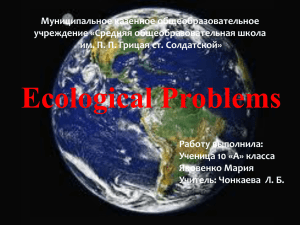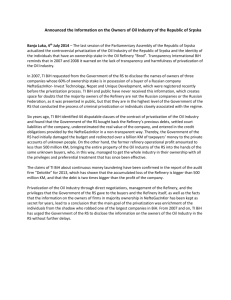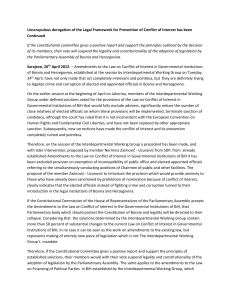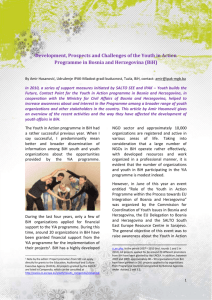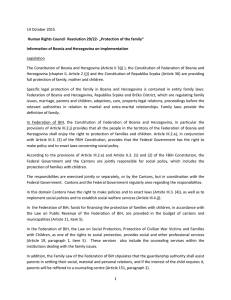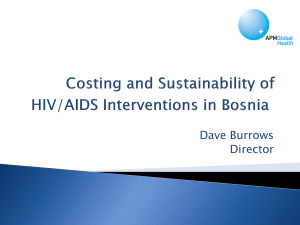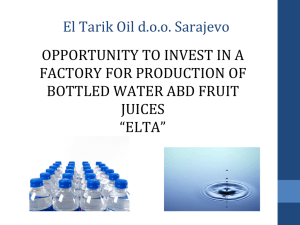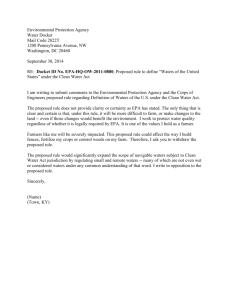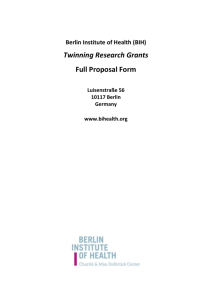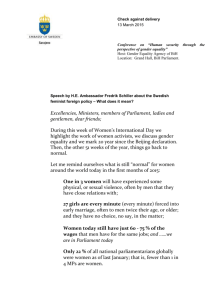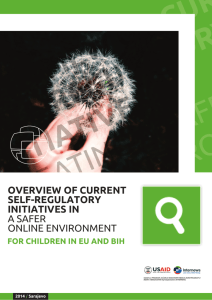Bosnia and Herzegovina - Office of the High Commissioner on
advertisement
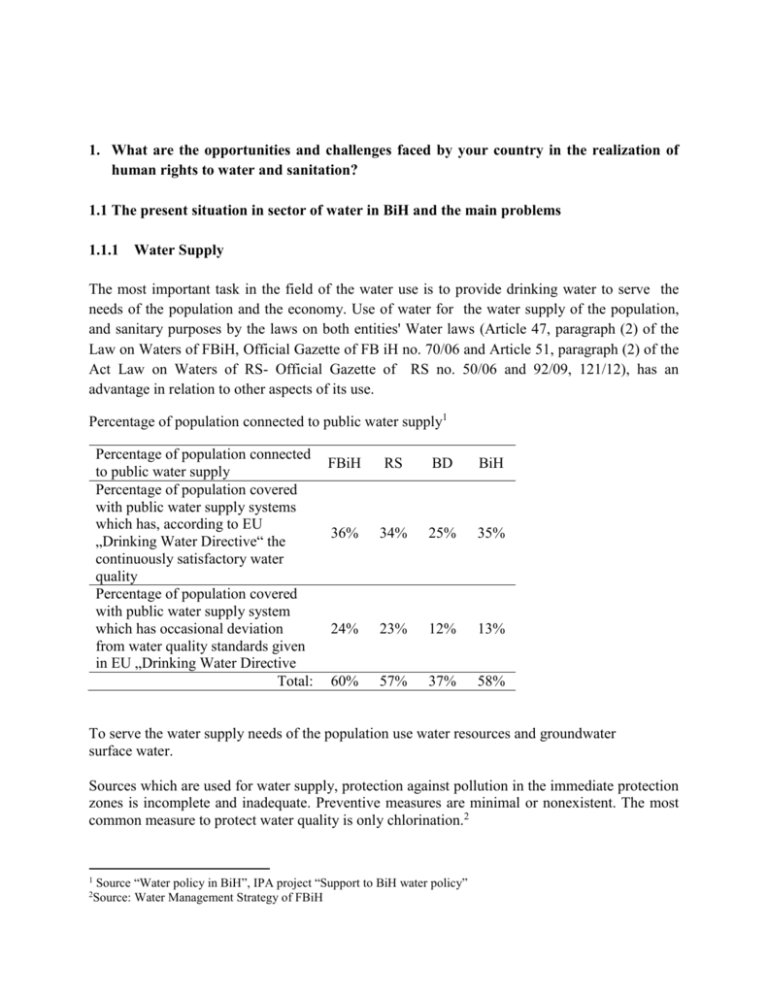
1. What are the opportunities and challenges faced by your country in the realization of human rights to water and sanitation? 1.1 The present situation in sector of water in BiH and the main problems 1.1.1 Water Supply The most important task in the field of the water use is to provide drinking water to serve the needs of the population and the economy. Use of water for the water supply of the population, and sanitary purposes by the laws on both entities' Water laws (Article 47, paragraph (2) of the Law on Waters of FBiH, Official Gazette of FB iH no. 70/06 and Article 51, paragraph (2) of the Act Law on Waters of RS- Official Gazette of RS no. 50/06 and 92/09, 121/12), has an advantage in relation to other aspects of its use. Percentage of population connected to public water supply1 Percentage of population connected FBiH to public water supply Percentage of population covered with public water supply systems which has, according to EU 36% „Drinking Water Directive“ the continuously satisfactory water quality Percentage of population covered with public water supply system which has occasional deviation 24% from water quality standards given in EU „Drinking Water Directive Total: 60% RS BD BiH 34% 25% 35% 23% 12% 13% 57% 37% 58% To serve the water supply needs of the population use water resources and groundwater surface water. Sources which are used for water supply, protection against pollution in the immediate protection zones is incomplete and inadequate. Preventive measures are minimal or nonexistent. The most common measure to protect water quality is only chlorination.2 1 2 Source “Water policy in BiH”, IPA project “Support to BiH water policy” Source: Water Management Strategy of FBiH There is an apparent stagnation in the development of water supply systems in BiH. The consequences are outdated equipment, poor condition of water supply facilities, poor state of water supplies, a number of bottlenecks in water supply systems whose capacity does not correspond to the growing needs of consumers. Water and Sanitation companies in charge of the production and distribution of water, still can not fully respond to the tasks assigned. Personnel structure employed in most water and sanitation companies is unsatisfactory. High water losses are one of the basic characteristics of water supply systems.3 1.1.2 Sanitation In this sector in BiH, as with the water system, level services is significantly below average compared to EU member states. Consumers who had access to water and sewerage system is about 32%, while the average in the EU approximately 75%. Also, in the city a connection is relatively low - about 60%4. Sewage networks and pumping stations, where they exist, are in poor condition, and this should be reconstructed. A special issue of sanitation settlements are unfinished sewer systems, which do not have facilities for wastewater treatment plants (WWTP), but the wastewater is discharged directly into water bodies, often in the vicinity of the village. In rural areas sanitation is also very bad. 1.2The main challenges management of water policy in Bosnia and Herzegovina are: As a result above mentioned issues/problems in sector of water supply and sanitation, the following priority aims have been identified: Drinking water supply for urban and rural areas; Wastewater collection and treatment of urban waste water; Higer percentage of overall population connected to public sewerage system; Rationalization of consumption and recirculates the use of treated waste water. 1.3 Strategic aims of water management policy in BiH Both entities’ Water laws (Federation of Bosnia and Herzegovina and Republic of Srpska) prescribe the adoption of planning documents for water management The Framework Plan for Water Management in Republic of Srpska has been developed and it this document defines the strategic objectives of developing in the water sector in RS. It describes the the current situation of water management infrastructure and the necessary conditions and criteria including restrictions for further development of water management and the entire water sector. 3 4 Source: The Framework Plan for Water Management in Republic of Srpska Source: The Framework Plan for Water Management in Republic of Srpska Water Management Strategy of FBiH is the key document with the planning horizon being 2022. The major goals defined in the these documents are classified in the following categories: Legal, Institutional and Economic Activity Framework with strategic objectives water sector legal and institutional reform, arising from the need to adopt to new social circumstances, along with the EU alignment in the water management sector, as a part of process of BiH stabilization and association to EU, adequate integration of water management sector in economic system as a whole, with larger representation of the economic tools in the process of water resources management, improving efficiency, transparency and accountability in water management, provision of financial viability in water management and reform of water pricing system along with progressive introduction of economic water price. Water Use With two strategic objectives: increase in coverage and improvement of public water supply systems, and ensuring conditions for sustainable use of water in the areas whose development depends on market interest. Water Protection With the following objectives: Achieving and maintaining good status of surface water and groundwater for the purpose of protection of aquatic flora and fauna and needs of water users. This includes also the achievement of the strategic objective: „Reducing the risk at extreme hydrological phenomena“, and implementation of the measures to achieve the operational objectives: reconstruction and rehabilitation of existing, and construction and maintenance of protection facilities for the purpose of increasing the safety level in terms of flood control; development and adoption of plans for protection against adverse effects of water; reduction of erosions; setting out programs to combat droughts, and prevention and preparedness in case of disaster, such as demolition of overflow. For more details abot above mantioned documents, please visit the website of Entities Ministries of Agriculture: Ministry of Agriculture, Water Management and Forestry, Federation of Bosnia and Herzegovina: http://www.fmpvs.gov.ba/index.php?lang=4 Ministry of Agriculture, Forestry and Water Management, Republic of Srpska http://www.vladars.net/eng/Pages/default.aspx 2. Are there any specific examples of legislation, policies, making budgets, programs and projects for the provision of services or mechanisms for seeking accountability in force, in your country, and that should be relevant to the exercise of the right to water and sanitation. Can you provide us with examlesof the relevant information? 2.1 Legal Framework of water management in BiH Field of integrated water resources management in BiH is regulated through a legal framework at the level of Entities (Federation of Bosnia and Herzegovina, Republic of Srpska) and Brcko District of Bosnia and Herzegovina. Specific jurisdictions are assigned to BiH Ministry of Foreign Trade and Economic Relations (MOFTER) over protection of the environment under the Law on Ministries and other administrative bodies of BiH57, sa specified in Article 9: “This Ministry shall also be responsible for carrying out tasks and discharging duties which are within the competence of BiH and relate to defining policy, basic principles, coordinating activities and harmonizing plans of the Entity authorities and bodies at the international level in the fields of agriculture, energy, protection of the environment, development and use of natural resources”. In order to implement water resource management, the Ministry of Agriculture, Forestry and Water Management is implementing the provisions of the Law on Waters (Official Gazette of RS No. 50/06, 92/09, 121/12) and bylaws, which is harmonized with the legislation of the European Union. In addition to integrated water management, the purpose of this Law is achievement of good status of water and prevention of its degradation, achievement of sustainable water use and ensuring equal access to water (Article 2). The Law prescribes the identification of locations and boundaries of structures and bodies of surface water and groundwater for the purpose of water management, as well as their initial characterization according to the methodology set out in the Water Framework Directive. The Ministry is responsible for the organization of monitoring of the implementation of necessary measures to prevent derogation of status of surface water and groundwater. To this end, the RS Government and the Ministry of Agriculture, Forestry and Water Management, have adopted legislation enabling protection from pollution through prevention activities and prevention of uncontrolled discharge of wastewater for water intended for human consumption and drinking water. The basic legal document that regulates the issue of water management is the FBiH Law on Waters(Official Gazette of FBiH No.70/06).Transposition of the Water Framework Directive (Directive 2000/60/EC of the European Parliament and of the Council of 23 October 2000) was done through the Law on Waters. Implemented assessment of compliance indicated that the Law on Waters is 93% compliant with the Directive. According to the provisions of Article 1 of the Law on Waters, the Law regulates water management within the territory of the FBiH. Water management includes: water protection, water use, protection from the harmful effects of water and arrangement of watercourses and other waters. According to provisions of Article 2 of the Law, the purpose of the Law is to ensure water management in order to: - reduce water pollution, achieve good water status and prevent degradation of water; - achieve sustainable water use; - ensure equitable access to water; - encourage social and economic development; - protect ecosystems; - reduce the risk of flooding and other adverse impacts of water; - ensure public participation in decision-making related to water; - prevent and resolve conflicts related to protection and use of water; - meet obligations under international agreements that are binding for BiH. Order of the Supervisor for BD BiH of 4 August 2006 transposed the RS Law on Waters (Official Gazette of RS, No. 10/98) as the Law of Brčko District of BiH. All by-laws that had been adopted by the time of adoption were also transposed with the RS Law on Waters. . 2.2 Criminal provisions Criminal offences against the environment are stipulated in the criminal laws of the FBiH, RS and Brčko District of BiH: - Criminal Code of the RepublikaSrpska(Official Gazette of RS, No. 49/03, 108/04, 37/06, 70/06, 73/10, 1/12 )– Chapter XV: Article 160. Chapter XXXIII, 415-420, 423-424, 427-432, 434-435 – Criminal offences against environment; - Criminal Code of the Federation of Bosnia and Herzegovina (Official Gazette of FBiH, No. 36/03, 37/03, 21/04, 69/04, 18/05, 42/10, 42/11) - Chapter XXVI, Articles 303-306, 313-317 Criminal offences against environment, agriculture and natural resources; and - Criminal Code of the Brčko District of Bosnia and Herzegovina (Official Gazette of BD BiH, No. 47/11) – consolidated - Chapter XXVI, Articles 297-300, 307-311, - Criminal offences against environment, agriculture and natural resources. All three criminal codes stipulate the following criminal offences against the environment, in the strict sense: environment pollution, environment pollution with waste, endangering environment with installations, endangering environment by noise, destruction of plantations, careless actions in circulation of pesticides, forest theft, devastation of forests and causing forest fire. Law on Waters of RS (Articles 209-215) and the Law on Waters ofFBiH(Articles 204-207) is regulated by criminal responsibility and punishment for criminal offenses in relation to the violation of the provisions of these Laws. Authorized body for the submission of applications and initiate misdemeanor proceedings is competent Water Agency and the competent authorities of the state administration, namely the Water Inspectorate, which in accordance with the laws of supervising the implementation of the provisions of the law in terms of its applications, especially respectful ways of using water rights and respect hidraulicacts. 2.3 Overview of financing of water sector5 in BiH According to the entity Laws on Water, in the water sectorthere are the following charges/fees: a. General water management fee, paid by all employees at the amount of 0,5% of net salary of employees (this fee exists only in the FB&H); b. Water abstraction fees, which include fees for: 1) abstraction of water for public water supply, paid by water supply companies and then passed to the final consumers for payment (KM/m3); 2) abstraction of water for producing bottled water and mineral water (KM/m3); 3) water abstraction for irrigation (KM/m3); 4) use of water for fish farming (KM/m3); 5) water for industrial processes, including thermo power plants (KM/m3); 6) water for other purposes (KM/m3). c. Special water fee for production of electricity using hydro energy (kWh/m3); d. Water protection fees: 1) fee paid by owners of transport vehicles using oil and oil products; 2) fee for wastewater discharge based on PE (Population Equivalent); 3) fee for fish farming, paid in KM/kg of produces fish; 4) fee for using fertilizers and chemicals for crop protection; e. Charges/fees for sand and gravel abstraction (KM/m3 of sand/gravel) f. Charges/fees for protection from waters, paid by: 1) owners of agricultural, forest or construction land protected by water protection objects (KM/ha); 2) owners of residential, business and other facilities protected by water protection objects (KM/m2). 5 Source: UNDP GoAL-WaSH Program (june 2009): SECTORAL ASSESSMENT OF BIH Amount of mentioned charges/fees are being established by the entity Governments. In the FB&H, revenues collected from mentioned fees are distributed among the following institutions: 40% to the relevant Water Agency; 45% to the Canton; and 15% to the Environment Protection Fund. In the RS, revenues collected from mentioned charges/fees, except for item d. charges 1), 2), 3), is as follows: 70% for special water purposes; 30% for local authorities. Item d. charges 1), 2), 3), are divided as follows: 55% for special water purposes; 15% for environment protection in RS; 30% for local authorities. The biggest projects in BiH in the field of water supply is carried out through the EU IPA programme (Instrument for Pre-Accession Assistance), and international financial resources of WB (World Bank), UNDP (United Nations DevelopmentProgramme), SIDA (Swedish International Development Cooperation Agency), and also loan funds of EBRD (European Bank for Reconstruction and Development), EIB (European Investment Bank) and others. In doing so, through the mechanisms of international cooperation achieves an extremely important source of investment in the field of environmental protection, as well as through programs of regional cooperation in the field of environment in which participatesBiH.
